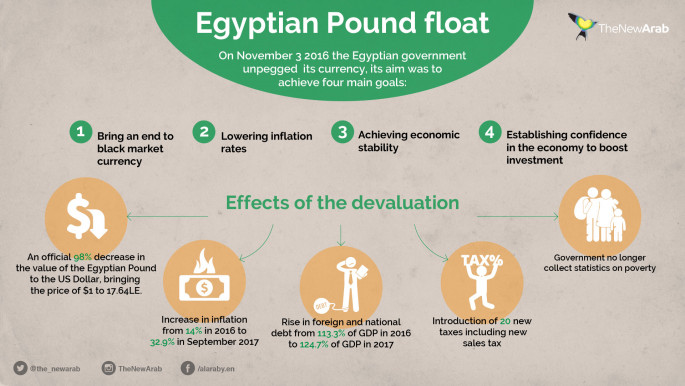The Egypt Report: Sisi the Scorpio-n
President Abdel Fattah al-Sisi turned 63 on Sunday. Both supporters and dissenters descended on the Facebook event to voice their dedicated, funny and sometimes ill wishes.
Most of those celebrating referred to Sisi's Sunday visit to Kafr al-Sheikh, where he inaugurated a fish factory that belongs to the military. The Egyptian military is said to own at least 40 percent of the Egyptian economy, throwing into question the political motivation of the military regime.
Among those celebrating Sisi's special day was the former prime minister of Lebanon, Saad al-Hariri who announced he will visit Cairo before Lebanon later this week. The purpose of the visit is unclear and its timing is critical.
Hariri has been under pressure to return to Lebanon for over a week, after fears he was "abducted" and forced to resign by Saudi Arabia, threw Lebanon into a frenzy.
The announcement of the visit coincided with reports that Egypt has halted Saudi attempts to suspend Lebanese membership of the Arab League in the event that the Lebanese government refuses to bow to Saudi pressure to side-line Hizballah.
The New York Post published a report claiming that former security chief and minister of interior to Hosni Mubarak, Habib al-Adly had been living in Riyadh and advising the crown prince, Mohammed bin Salman.
Adly was released pending trial in November 2016, but by the time he was sentenced to seven years in prison and a 200 million Egyptian Pound fine on charges of corruption, he had left the country.
Adly was declared a fugitive shortly after he was sentenced, but it was clear that the ministry he once ran did little to pursue him.
#WeStillNeedToTalk
The Egyptian judiciary celebrated Sisi's birthday by denying human rights activist Mahinour el-Masry bail, pending trial late next month. Mahinour was arrested along with four other activists last June.
Charged with protesting without legal permit, Mahinour was involved in the protest wave that swept the country this summer in opposition to Egyptian President Sisi's decision to divest of two islands strategically significant to Saudi Arabia.
El-Masry is a prominent activist from Alexandria, famous for her dedication to Khaled Said's case - the young Egyptian beaten and killed by police in Alexandria in 2010. Said's murder is often seen as the spark that ignited the January 25 uprising.
 |
The head of the National Media Council followed President Sisi's lead announcing that there are no imprisoned journalists in the country |  |
Makram Mohamed Ahmed, head of the National Media Council, followed President Sisi's lead announcing that there are no imprisoned journalists in the country. Sisi had made a similar statement during his visit to France where he claimed that there are no political prisoners in Egypt.
It is unclear why Sisi and his officials make such statements when it is a well-documented fact that since taking power in 2014 the Egyptian regime built 20 new prisons to house the masses they have incarcerated. Horror stories of Tora's Scorpion prison have also been documented by many human rights organisations.
Among those incarcerated is former Egyptian president Mohamed Morsi who has been suffering a slew of health issues. Morsi and his family had repeatedly petitioned the courts to allow the 66-year-old to be transferred to hospital, their pleas were finally accepted on the condition that Morsi pay for his treatments.
Postcard from Egypt
![Sisi memes have been a staple of Egyptian Social Media looked at as a form of dissent by a people who are known for their sense of humour [Facebook] Sisi memes have been a staple of Egyptian Social Media looked at as a form of dissent by a people who are known for their sense of humour [Facebook]](https://www.newarab.com/sites/default/files/styles/medium_16_9/public/media/images/242539FE-2C68-4600-AF9F-774432336A20.jpg?h=d1cb525d&itok=4EnGlYnW) |
|
|
Sisi memes have been a staple of Egyptian social media, and looked at as a form of dissent |
Media meltdown
Egyptian singer Shereen Abdel Wahab faced media fury this week after a video of her taken at one of her concerts in the UAE last January surfaced. In the video Shereen is asked by a fan to sing a tune she had released years earlier.
The song is a nationalist anthem called "Did you drink from Egypt's Nile". In response to the fan's request, Shereen sarcastically replied "if you drink from The Nile you will get Bilharzia, drink Evian it's better for you".
 |
In response to the fan's request, Shereen sarcastically replied 'if you drink from The Nile you will get Bilharzia, drink Evian it's better for you' |  |
Nightly talk show hosts eagerly discussed the gaffe, branding it a national insult. In what felt like a pharaonic déjà vu, the pundits revered The Nile as the chief Egyptian symbol; the god their ancestors had once worshipped.
The fervour whipped up on television quickly translated into action. The Syndicate of Musicians suspended Shereen's membership and her tearful apology has yet to save her from facing a stint in jail.
The reaction to Shereen's gaffe signals a shift in the direction within the Egyptian regime towards an even more unforgiving draconian stance. Shereen, who was among those famous faces fanning the flames of fear against the Islamist Muslim Brotherhood rule, and upholding the secular glory of the military, is today a victim of those she once promoted.
Now that the Egyptian regime has run out of activists to scapegoat for its failures, it appears to have turned against its supporters. And why not? While the masses surrounded Shereen with their indignation, newspapers quietly announced the failure of yet another Egyptian attempt to halt the operation of Ethiopia's Grand Renaissance Dam.
Ironically, as Shereen's insult to The Nile landed her in legal trouble, Sisi's failure to keep The Nile flowing in Egypt will possibly pass without consequence.
Egypt's economy saw a $2bn boost from the IMF
This brings the total approved loan instalments to $6bn, half of the agreed upon $12bn loan. The IMF praised the Egyptian government's dedication to applying reforms requested by the fund.
 |
|
| [Click to enlarge] |
The neoliberal reforms to the Egyptian economy saw the government devalue the currency from 8.88EGP to the USD in November 2016, to 17.68EGP in September 2017. The inflation rate in turn rose from 14 percent to 32.9 percent a year later.
This automatically caused the collective living standard of Egyptians to fall, as wages were not adjusted according to inflation or the devaluation of the local currency.
The government also lifted subsidies on many essential goods including fuel and natural gas. Government aid to the poor was also downgraded, leaving many families unable to make ends meet.



